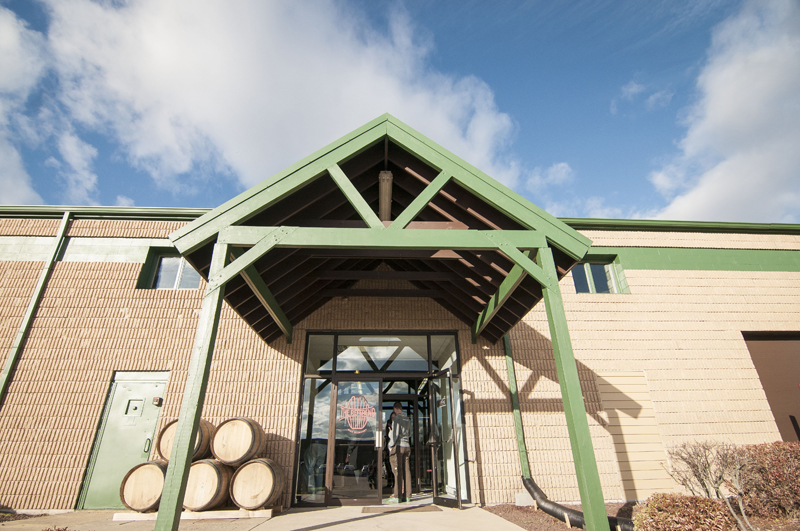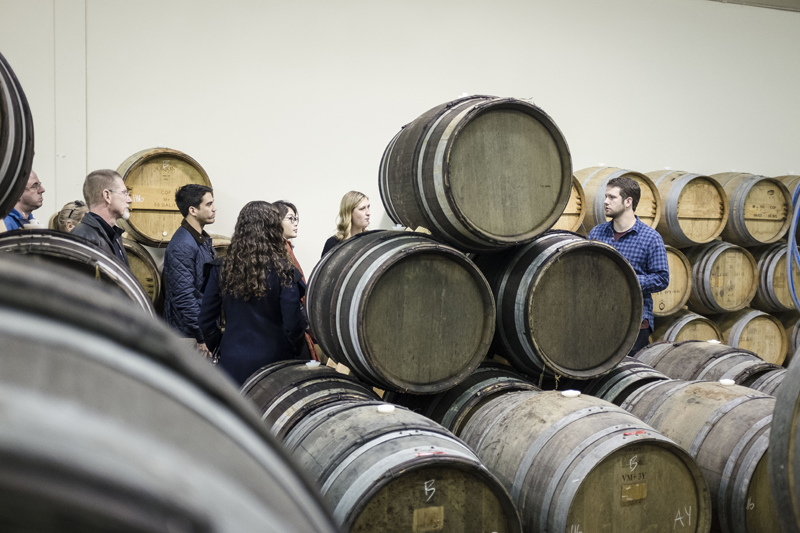The Referend Bier Blendery: Where the Wild Brews Are
Photo Credit: Justin McLeod
By Sarah Emily Gilbert
December was a boozy month for the town of Hopewell, New Jersey. It marked the grand opening of two new breweries: Troon Brewing on the property of Double Brook Farm (130 Hopewell Rocky Hill Road) and The Referend Bier Blendery located on 1595 Reed Road. You might think this could lead to a “Battle of the Brews,” but in reality, it’s a welcomed coincidence according to James Priest, owner and founder of The Referend.
“Whenever you’re at either place, everyone is talking about the other one too,” he explains. “It’s great; we’re doing two considerably different beer styles, and people are really excited about both. On Untappd [an app where users can check-in to breweries and share their experiences], we’re the two highest rated breweries in New Jersey right now, so we’re trying to keep that going.”
The Referend isn’t just different from Troon, but the vast majority of breweries in the United States. This is due impart to the fact that the startup isn’t actually a brewery but a “bier blendery.” Priest explains that he doesn’t have a brewhouse of his own, which is where the “brewing” technically occurs. Instead, he travels to other breweries where he creates a specifically engineered wort, which is basically unfermented beer; pumps the boiling wort into a mobile coolship, or an open-top vessel in which wort cools; and brings the still non-alcoholic wort back to the blendery to spontaneously ferment in oak barrels.

The intricate art of spontaneous fermentation is the traditional brewing process for the most idiosyncratic type of beer you’ll taste: lambic. A Belgian specialty that dates back to the Roman Empire, lambic-style beers are relatively rare stateside. A handful of independent American breweries produce spontaneously fermented beer, but The Referend is the only brewery in the country that never adds cultured yeast to their beer. In short, Priest is likely “blending” up the most authentic lambic beer in the nation.
Unlike most beers that are fermented in sterile tanks with carefully selected strains of yeast engineered in a laboratory, Priest’s are left in his coolships overnight where wild yeasts and microbes in the air can enter the brew. The average brewer tries to prevent natural microbes from taking residence in their beer to avoid unpredictable flavors. Priest, on the other hand, embraces the “wildness” that is integral to lambics.
“It is not at all hard to ferment beer spontaneously,” says Priest. “What is difficult is completely ceding control to nature, which these beers require of you immediately. In turn, nature rewards you for trusting in its own process, on its own timeline. It seems to be a more philosophical brewing method than most.”
Mother Nature is indeed on her own timeline when it comes to the fermentation process. Once Priest transfers the wort to aged oak barrels to spontaneously ferment, they take anywhere between four months and four years to mature.
“I let the beer tell us when its ready to be enjoyed,” says the ever-patient Priest. “It’s consistently slower than one would hope, but I’m committed to its autonomy.”
There are some lambic-style beers that ease the waiting process. Priest explains that Jung, which is German for young, is served intentionally prematurely at months old to highlight the early developing complexities in the beer’s adolescence.
The aging process of lambic beer is similar to that of wine – and in some ways, so is the taste. Although all the beer produced at The Referend falls under the category of sour beer, Priest likens the taste to a dry wine, champagne, or cider. Others describe the flavor as earthy, hay-like, or leathery. There’s no debating that lambics have an impactful taste, even Priest had to ease-into the old-world beer.

“One of the earliest ones I remember having is Cantillon Gueuze, which is sort of held up as a benchmark for the lambic-style,” says Priest. “I found it slightly off-putting and couldn’t quite pick some of the associations, but I wanted to kind of delve into what else was going on there. Even when I found it, I had the desire to acquire the taste. In a matter of beers, I was legitimately enjoying them not just as an exploration.”
“Some lambics are very approachable for everyone and aren’t that much of an acquired taste,” he continues. “Other lambics certainly can be if you start getting any of the strong, funkier aromas and flavors. In that case, it can take a few times and it did for me.”
With the increasing popularity of sour beers, there’s perhaps no better time for Priest to introduce his brews to the public. The Referend’s grand opening brought tons of thirsty Hopewellians to the previous site of Pennington Athletic Club (now Pennington Ewing Athletic Center) to taste the unconventional beer. The local support is reciprocating by Priest. A Chicago-native, he’s gone full-Jersey at The Referend. His “blends” have featured “Jersey Fresh” peaches, nectarines, grapes, hops, spelt, and grain. “There’s so much in the area,” says Priest, “that it’s thankfully very easy to seek out farmers for whatever we’re looking for and drag it down to The Referend.”
You have to go to the source to try one of Priest’s lambics. The Referend’s beer isn’t sold for off-site consumption, and due to the delicate nature of certain lambics, kegging isn’t advisable. Priest has completed one round of bottling, but they most likely won’t be ready for consumption until springtime. In true lambic style, it takes many months for the beer to carbonate or re-ferment in the bottle. Luckily, you don’t have to wait long to taste some of Priest’s other creations. The Referend’s Tasting Room is open from 2 to 8 p.m. on the first and third Saturdays of each month, making the next tasting January 21, followed by February 4. If you plan on stopping by, you mine as well make it a beer tour. The Blendery is merely two miles away from River Horse Brewing Company in Ewing and eight miles from Troon Brewing in Pennington. Now that’s the way to start the weekend. Cheers!



